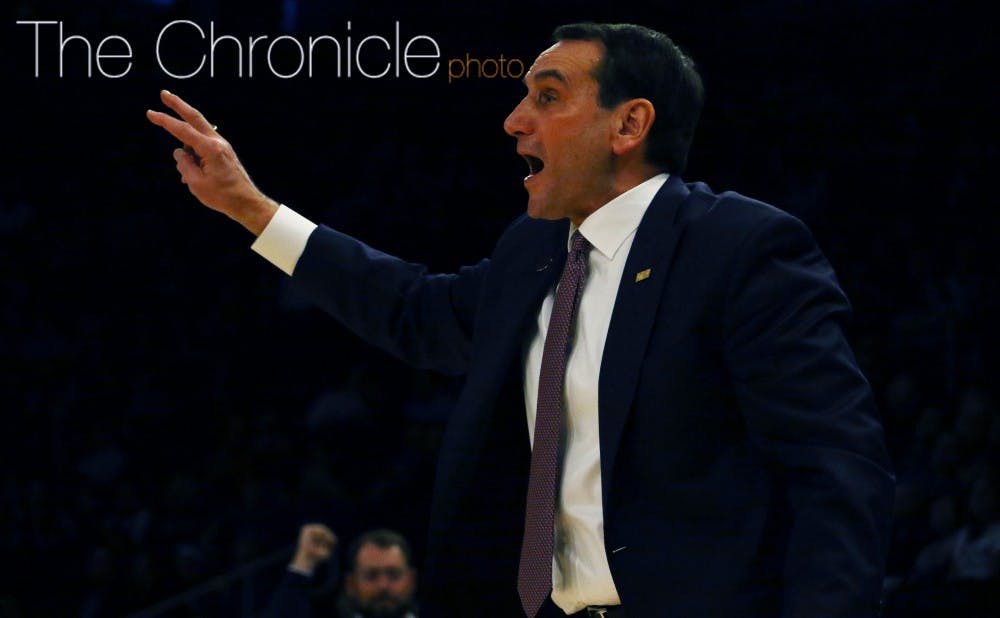NEW YORK—The decisive moment of Duke's come-from-behind win Friday didn’t occur when Grayson Allen hit one of his four 3-pointers. It also didn’t take place when Allen left Doug Brooks wondering just where in the world he was and why his ankles were so sore as Allen knifed through the lane and converted the contested and-1 layup.
No, Friday’s standout moment came with a simple visit to the scorer’s table and the insertion of a player who would go on to score zero points from the field. Freshman Luke Kennard spelled center Marshall Plumlee as the Blue Devils went small—a shift that paid dividends on both ends of the floor.
“In a game like this especially, to have a big guy handle the ball—that’s why it was tough to have two big guys in, because they clog the lane,” Duke head coach Mike Krzyzewski said. “And then they couldn’t even put more pressure on the handlers. Amile gives us an opportunity to have basketball players out there, not five positions.”
The Blue Devil offense floundered in the first half as Duke dealt with the aggressive Virginia Commonwealth defense. The Rams' full-court press and hyperactive guard play presented a matchup problem for the Blue Devils' large starting lineup. With Plumlee and forward Amile Jefferson on the court, Duke was limited mainly to pick-and-roll-based sets, which Virginia Commonwealth either ducked under or squeezed over to negate the pick.
In Tuesday’s loss to Kentucky, the larger lineup worked briefly because Plumlee controlled the offensive glass. The graduate student pouring in nine points, five rebounds and one block in the opening 4:16 on his way to a double-double.
But against a Rams lineup with plenty of athleticism but lacking the length of Kentucky, Duke didn't need a center. It needed, as Krzyzewski put it, a “basketball player.”
Plumlee's ability to clog the lane did not help much in the first half, as speedy Ram guards like Melvin Johnson, Jequan Lewis and Korey Billbury lived in the paint, using pick-and-rolls to draw Plumlee out of the paint and expose the resulting driving lanes.
So when Krzyzewski replaced Plumlee with Kennard with 11:38 remaining in the game, Duke's small-ball lineup helped neutralize the Rams. Although Kennard missed all four shots he took from the field, it was his aggressive defensive play and four rebounds that invigorated Duke and led to a decisive 15-4 run.
“Luke had a lot of minutes tonight. He hasn’t shot like he will shoot—a couple of them went in-and-out,” Krzyzewski said. “I thought he played well. That’s another thing—it’s easy to see [Thorton and Allen] with 19 and 30 points, but Luke played a really good game, and he didn’t hit a shot. What we’re trying to show him is it’s more than hitting a shot. Be a good player. And he was a good player.”
The addition of Kennard gave the Blue Devils more offensive freedom and a well-spaced floor. Duke’s offense was looser and more fluid in the second half than the first, with all four perimeter players cutting through the lane constantly and making use of their own speed to find open shots and open lanes opposed to waiting for a screen or set play to develop.
The Blue Devil attack, at that point, was simply five guys playing unfiltered, unscripted basketball.
“We junked our offense, calling stuff, and we just ran motion, and that gave our guys room to just be basketball players,” Krzyzewski said. “It seemed like they got a good verve. It’s all on them and they got it. Having the four perimeter guys in there was better at running motion than having the two big guys in.”
The decision to replace Plumlee with Kennard also jumpstarted the team’s defensive play, which, to that point, had been consistently burned in transition. The lineup shuffle bumped Jefferson down to play center—a position he handled well while stifling Frank Kaminsky in the second half of the national title game in April—and allowed the Blue Devils to consistently switch on defense whenever the Rams tried to find a mismatch.
By the time Virginia Commonwealth gathered itself, Duke owned a 10-point lead and continued to play small-ball for much of the remainder of the game to seal its third victory of the season.
“That stretch from the 11-and-a-half minute mark to about the seven-and-a-half minute mark got away from us a little bit," Rams head coach Will Wade said. "We missed some chippies, turned it over too much—I feel like we were almost trying too hard during that stretch.”
A quick pace leading to turnovers and wasted possessions is the hoped-for result when a team goes to a small lineup. That's exactly what Duke got Friday, and it produced a game-altering 11-point swing.
All thanks to one simple switch.
Get The Chronicle straight to your inbox
Signup for our weekly newsletter. Cancel at any time.

